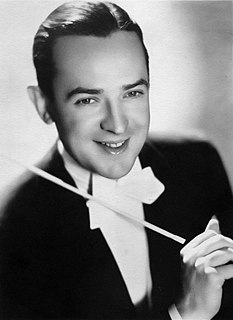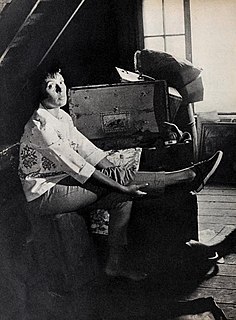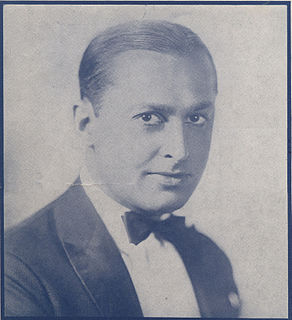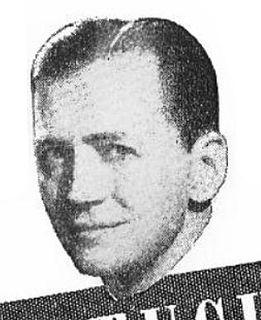Related Research Articles

Norma Deloris Egstrom, known professionally as Peggy Lee, was an American jazz and popular music singer, songwriter, composer, and actress, over a career spanning seven decades. From her beginning as a vocalist on local radio to singing with Benny Goodman's big band, Lee created a sophisticated persona, writing music for films, acting, and recording conceptual record albums combining poetry and music.

Thomas Francis Dorsey Jr. was an American jazz trombonist, composer, conductor and bandleader of the big band era. He was known as the "Sentimental Gentleman of Swing" because of his smooth-toned trombone playing. His theme song was "I'm Getting Sentimental Over You". His technical skill on the trombone gave him renown among other musicians. He was the younger brother of bandleader Jimmy Dorsey. After Dorsey broke with his brother in the mid-1930s, he led an extremely successful band from the late 1930s into the 1950s. He is best remembered for standards such as "Opus One", "Song of India", "Marie", "On Treasure Island", and his biggest hit single, "I'll Never Smile Again".

Harry Haag James was an American musician who is best known as a trumpet-playing band leader who led a big band from 1939 to 1946. He broke up his band for a short period in 1947 but shortly after he reorganized and was active again with his band from then until his death in 1983. He was especially known among musicians for his technical proficiency as well as his tone, and was influential on new trumpet players from the late 1930s into the 1940s. He was also an actor in a number of films that usually featured his band.

James Francis Dorsey, professionally known as Jimmy Dorsey, was an American jazz clarinetist, saxophonist, composer and big band leader. He recorded and composed the jazz and pop standards "I'm Glad There Is You " and "It's The Dreamer In Me". His other major recordings were "Tailspin", "John Silver", "So Many Times", "Amapola", "Brazil ", "Pennies from Heaven" with Bing Crosby, Louis Armstrong, and Frances Langford, "Grand Central Getaway", and "So Rare". He played clarinet on the seminal jazz standards "Singin' the Blues" in 1927 and the original 1930 recording of "Georgia on My Mind", which were inducted into the Grammy Hall of Fame.

Ella Mae Morse was an American singer of popular music whose 1940s and 1950s recordings mixing jazz, blues, and country styles influenced the development of rock and roll. Her 1942 recording of "Cow-Cow Boogie" with Freddie Slack and His Orchestra gave Capitol Records its first gold record. In 1943, her single "Get On Board, Little Chillun", also with Slack, charted in what would soon become the R&B charts, making her one of the first white singers to do so. Morse stopped recording in 1957 but continued to perform and tour into the 1990s. In 1960 she received a star on the Hollywood Walk of Fame.

Dorothy Jacqueline Keely, better known as Keely Smith, was an American jazz and popular music singer, who performed and recorded extensively in the 1950s with then-husband Louis Prima, and throughout the 1960s as a solo artist.

Paul Weston was an American pianist, arranger, composer, and conductor who worked in music and television from the 1930s to the 1970s, pioneering mood music and becoming known as "the Father of Mood Music". His compositions include popular music songs such as "I Should Care", "Day by Day", and "Shrimp Boats". He also wrote classical pieces, including "Crescent City Suite" and religious music, authoring several hymns and masses.

George Robert Crosby was an American jazz singer and bandleader, best known for his group the Bob-Cats, which formed around 1935. The Bob-Cats was a New Orleans Dixieland-style jazz octet. He was the younger brother of famed singer and actor Bing Crosby. On TV, Bob Crosby guest-starred in The Gisele MacKenzie Show and was also seen on The Jack Benny Program. Crosby hosted his own afternoon TV variety show on CBS, The Bob Crosby Show (1953–1957). Crosby received two stars on the Hollywood Walk of Fame, for television and radio.

Martha Tilton was an American popular singer during America's swing era and traditional pop period. She is best known for her 1939 recording of "And the Angels Sing" with Benny Goodman.

Julia Frances Newbern-Langford was an American singer and actress who was popular during the Golden Age of Radio and made film and television appearances for over two decades.

Benjamin Anzelwitz, known professionally as Ben Bernie, was an American jazz violinist, bandleader, and radio personality, often introduced as "The Old Maestro". He was noted for his showmanship and memorable bits of snappy dialogue, being part of the first generation of "stars" of American popular music, alongside other artists such as Paul Whiteman, Ted Lewis and Al Jolson.

Edythe Wright was an American singer who performed from 1935 to 1939 with the band led by Tommy Dorsey.
On August 1, 1942, the American Federation of Musicians, at the instigation of union president James C. Petrillo, began a strike against the major American record companies because of disagreements over royalty payments. Beginning at midnight, July 31, 1942, no union musician could make commercial recordings for any commercial record company. That meant that a union musician was allowed to participate on radio programs and other kinds of musical entertainment, but not in a recording session. The 1942–1944 musicians' strike remains the longest strike in entertainment history.

Harry Barris was an American popular singer and songwriter. He was one of the earliest singers to use "scat singing" in recordings. Barris, one of Paul Whiteman's Rhythm Boys, along with Bing Crosby and Al Rinker, scatted on several songs, including "Mississippi Mud," which Barris wrote in 1927.
Frances Wayne was an American jazz vocalist. She was best known for her recording of "Happiness Is Just a Thing Called Joe."

Gerald L. Duppler, better known under his stage name Tommy Tucker, was an American bandleader.

Bonnie Baker(néeEvelyn Underhill or Nelson, April 1, 1917 – August 11, 1990) was an American singer of jazz and popular music and was known from 1936 to the end of her performing career as Wee Bonnie Baker. Her biggest hit was "Oh Johnny, Oh Johnny, Oh!," recorded with the Orrin Tucker Orchestra in 1939.

Eugenie Baird was an American big-band singer.

Catherine Virginia Verrill was a singer in the era of old-time radio and big bands. Her work included providing the off-screen singing voices for some female film stars.

The Stage Door Canteen was an entertainment venue for American and Allied servicemen that operated in the Broadway theatre district of New York City throughout World War II. Founded by the American Theatre Wing (ATW) in 1942, the entertainers were largely unpaid; volunteering their talents as a way of supporting the morale of American troops during the war. Several women in leadership with the ATW played a critical role in establishing the Stage Door Canteen, including actress Nedda Harrigan and ATW co-founders Louise Heims Beck and Antoinette Perry. The canteen opened March 2, 1942 and operated seven nights a week in the previously unoccupied Little Club under the 44th Street Theatre at 216 West 44th Street in Manhattan.
References
- 1 2 3 "Amy Arnell To Appear Here With Tucker". The Daily Mail. Maryland, Hagerstown. May 6, 1943. p. 8. Retrieved October 27, 2018– via Newspapers.com.

- ↑ "(untitled)". Radio and Television Mirror. 17 (4): 74. February 1942. Retrieved 27 October 2018.
- 1 2 Ferris, John (April 26, 1942). "Band With Good Canary Will Never Get 'the Bird'". The Courier-Journal. Kentucky, Louisville. p. 27. Retrieved October 30, 2018– via Newspapers.com.

- ↑ "Short Subjects". Motion Picture Herald. May 8, 1943. p. 1304. Retrieved 27 October 2018.
- ↑ "Short Subjects". Motion Picture Herald. November 8, 1947. p. 3919. Retrieved 27 October 2018.
- ↑ Dunning, John (1998). On the Air: The Encyclopedia of Old-Time Radio (Revised ed.). New York, NY: Oxford University Press. p. 28. ISBN 978-0-19-507678-3.
- ↑ Terrace, Vincent (1999). Radio Programs, 1924-1984: A Catalog of More Than 1800 Shows. McFarland & Company, Inc. pp. 274–275. ISBN 978-0-7864-4513-4.
- ↑ "In Hollywood". Variety. December 28, 1945. p. 28. Retrieved 27 October 2018.
- ↑ "Amy Arnell Also Will Try a Solo". Variety. November 24, 1943. p. 49. Retrieved 27 October 2018.
- ↑ "State, N.Y." Variety. December 22, 1943. p. 20. Retrieved 27 October 2018.
- ↑ Alden, Ken (May 1942). "Facing the Music". Radio and Television Mirror. 18 (1): 12. Retrieved 27 October 2018.